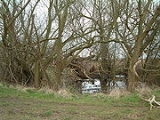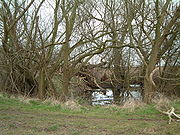
West Leake
Encyclopedia
West Leake is a small village and civil parish in the Rushcliffe
district of Nottinghamshire
. It is on the Kingston Brook
, between the larger village of East Leake
to the east and Kingston
to the west; the parish of Sutton Bonington
lies to the south. The parish church is St. Helena's Church, West Leake
.
As a small village West Leake has a parish meeting
rather than a parish council. Its population has declined from an 1853 estimate of 190 when the village was owned by Lord Middleton to around 110 in 2007.
The origin of Leake appears to be Laeke (Old Norse - brook or stream), and is consistent with West Leake's position in the heart of the Danelaw.
One of the earliest mentions of West Leake is in the Domesday book
recorded as 'Leche', the name comes from the Anglo-Saxon word meaning water-meadow, since the village lies on the Kingston Brook, a tributary of the River Soar. In the Domesday Book it is listed amongst the lands given to Henry de Ferrers
by the King
. The land required 21 ploughs in total, there was a mill and a church and it was valued at seven pounds.
A dew pond
is situated on the hill above the village towards West Leake hills.

Rushcliffe
Rushcliffe is a local government district with borough status in Nottinghamshire, England. Its council is based in West Bridgford. It was formed on 1 April 1974 by merging the West Bridgford Urban District, the Bingham Rural District and part of Basford Rural District.-Political representation:The...
district of Nottinghamshire
Nottinghamshire
Nottinghamshire is a county in the East Midlands of England, bordering South Yorkshire to the north-west, Lincolnshire to the east, Leicestershire to the south, and Derbyshire to the west...
. It is on the Kingston Brook
Kingston Brook
Kingston Brook is a small river in central England. It arises near Old Dalby, Leicestershire on the northern edge of the ridge running from Normanton-on-Soar, Nottinghamshire to Belvoir, Leicestershire...
, between the larger village of East Leake
East Leake
East Leake is a large village and civil parish in the Rushcliffe district of Nottinghamshire, England, although its closest town and postal address is Loughborough across the border in Leicestershire. It has a population of around 7,000. The original village was located on the Sheepwash Brook. ...
to the east and Kingston
Kingston on Soar
Kingston on Soar is a village and civil parish in the Rushcliffe borough of Nottinghamshire, England. It has a population of 239, as of the 2001 census.It has 4 centres of population: the Village, Kingston Hall, New Kingston and Kingston Fields....
to the west; the parish of Sutton Bonington
Sutton Bonington
Sutton Bonington is a village and civil parish lying along the valley of the River Soar in the Borough of Rushcliffe, south west Nottinghamshire, England. The University of Nottingham has a site just to the north of the village: Sutton Bonington Campus....
lies to the south. The parish church is St. Helena's Church, West Leake
St. Helena's Church, West Leake
St. Helena's Church, West Leake is a parish church in the Church of England in West Leake, Nottinghamshire.The church is Grade II* listed by the Department for Culture, Media & Sport as it is a particularly significant building of more than local interest....
.
As a small village West Leake has a parish meeting
Parish meeting
A parish meeting, in England, is a meeting to which all the electors in a civil parish are entitled to attend. In some cases, where a parish or group of parishes has fewer than 200 electors, the parish meeting can take on the role of the parish council itself, with statutory powers, and electing a...
rather than a parish council. Its population has declined from an 1853 estimate of 190 when the village was owned by Lord Middleton to around 110 in 2007.
The origin of Leake appears to be Laeke (Old Norse - brook or stream), and is consistent with West Leake's position in the heart of the Danelaw.
One of the earliest mentions of West Leake is in the Domesday book
Domesday Book
Domesday Book , now held at The National Archives, Kew, Richmond upon Thames in South West London, is the record of the great survey of much of England and parts of Wales completed in 1086...
recorded as 'Leche', the name comes from the Anglo-Saxon word meaning water-meadow, since the village lies on the Kingston Brook, a tributary of the River Soar. In the Domesday Book it is listed amongst the lands given to Henry de Ferrers
Henry de Ferrers
Henry de Ferrers was a Norman soldier from a noble family who took part in the conquest of England and is believed to have fought at the Battle of Hastings of 1066 and, in consequence, was rewarded with much land in the subdued nation.His elder brother William fell in the battle. William and Henri...
by the King
William I of England
William I , also known as William the Conqueror , was the first Norman King of England from Christmas 1066 until his death. He was also Duke of Normandy from 3 July 1035 until his death, under the name William II...
. The land required 21 ploughs in total, there was a mill and a church and it was valued at seven pounds.
A dew pond
Dew pond
A dew pond is an artificial pond usually sited on the top of a hill, intended for watering livestock. Dew ponds are used in areas where a natural supply of surface water may not be readily available. The name dew pond is first found in the Journal of the Royal Agricultural Society in 1865...
is situated on the hill above the village towards West Leake hills.


